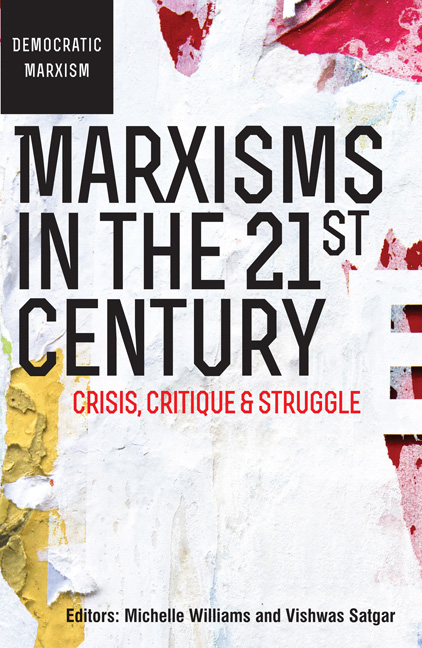Book contents
- Frontmatter
- Miscellaneous Frontmatter
- Acknowledgements
- Contents
- Acronyms and Abbreviations
- Introduction
- PART ONE DEMOCRATISING AND GLOBALISING MARXISM
- PART TWO MARXISM AND LEFT POLITICS
- PART THREE CRISES OF MARXISM IN AFRICA AND POSSIBILITIES FOR THE FUTURE
- Chapter 7 Retrospect: Seven theses about Africa's Marxist regimes
- Chapter 8 Socialism and Southern Africa
- Chapter 9 Uneven and combined Marxism within South Africa's urban social movements
- Chapter 10 Critical reflections on the crisis and limits of ANC ‘Marxism’
- Conclusion
- Contributors
- Index
Chapter 10 - Critical reflections on the crisis and limits of ANC ‘Marxism’
from PART THREE - CRISES OF MARXISM IN AFRICA AND POSSIBILITIES FOR THE FUTURE
Published online by Cambridge University Press: 21 April 2018
- Frontmatter
- Miscellaneous Frontmatter
- Acknowledgements
- Contents
- Acronyms and Abbreviations
- Introduction
- PART ONE DEMOCRATISING AND GLOBALISING MARXISM
- PART TWO MARXISM AND LEFT POLITICS
- PART THREE CRISES OF MARXISM IN AFRICA AND POSSIBILITIES FOR THE FUTURE
- Chapter 7 Retrospect: Seven theses about Africa's Marxist regimes
- Chapter 8 Socialism and Southern Africa
- Chapter 9 Uneven and combined Marxism within South Africa's urban social movements
- Chapter 10 Critical reflections on the crisis and limits of ANC ‘Marxism’
- Conclusion
- Contributors
- Index
Summary
At the heart of South Africa's national liberation struggle was the constitution of a future South African nation in which white domination would be defeated. From the 1960s the Oliver Tambo-led African National Congress (ANC) increasingly used Marxist tools to develop its analysis of the South African social formation that had been shaped by three centuries of colonial dispossession and close to a century of capitalist development. The ANC defined and characterised this social formation as a ‘colonialism of a special type’ (CST) in which all classes and strata of black people were oppressed on the basis of their race. According to the ANC, what was needed to free black people from this national oppression was a multi-class revolutionary front uniting all the oppressed in prosecuting a national democratic revolution (NDR). This ANC theorisation of the social formation and the required political strategy also asserted the crucial and leading role of the working class in the revolutionary process and that the struggle for national liberation would be incomplete without fundamentally and systematically shaking the roots of racialised capitalism in South Africa, even though the ANC did not necessarily mean, or accept the necessity of, a transition to socialism. In essence, the ANC's use of Marxism was vanguardist and shaped by Stalinised/sovietised influences that were transmitted to it through leading members of the South African Communist Party (SACP) who, from the 1960s, dominated ANC theoretical perspectives.
What has become of the ANC's use of Marxism? What do the nineteen years of post-apartheid ANC rule and nation-building say about the scope and limits of the ANC's ‘Marxism’? This chapter critically engages with the CST thesis and shows that the ANC's continued use of Marxism has been transformed into attempts to hegemonise and marry the working class to a project to transnationalise and deracialise South African capitalism. This has been through what the chapter describes as an Afro-neoliberal project that defines the ANC in government today. In addition to this critique of the limits of Afro-neoliberalism in resolving the national question, the chapter takes the argument further by reviewing how the ANC's nation-building project has failed to grapple with racialised post-apartheid social struggles over housing in the Western Cape. The chapter provides a second case study, which reviews sustained ANC government legislative efforts to retribalise the former bantustan countryside against the logic of a progressive nation-building project.
- Type
- Chapter
- Information
- Marxisms in the 21st CenturyCrisis, Critique & Struggle, pp. 260 - 280Publisher: Wits University PressPrint publication year: 2013



